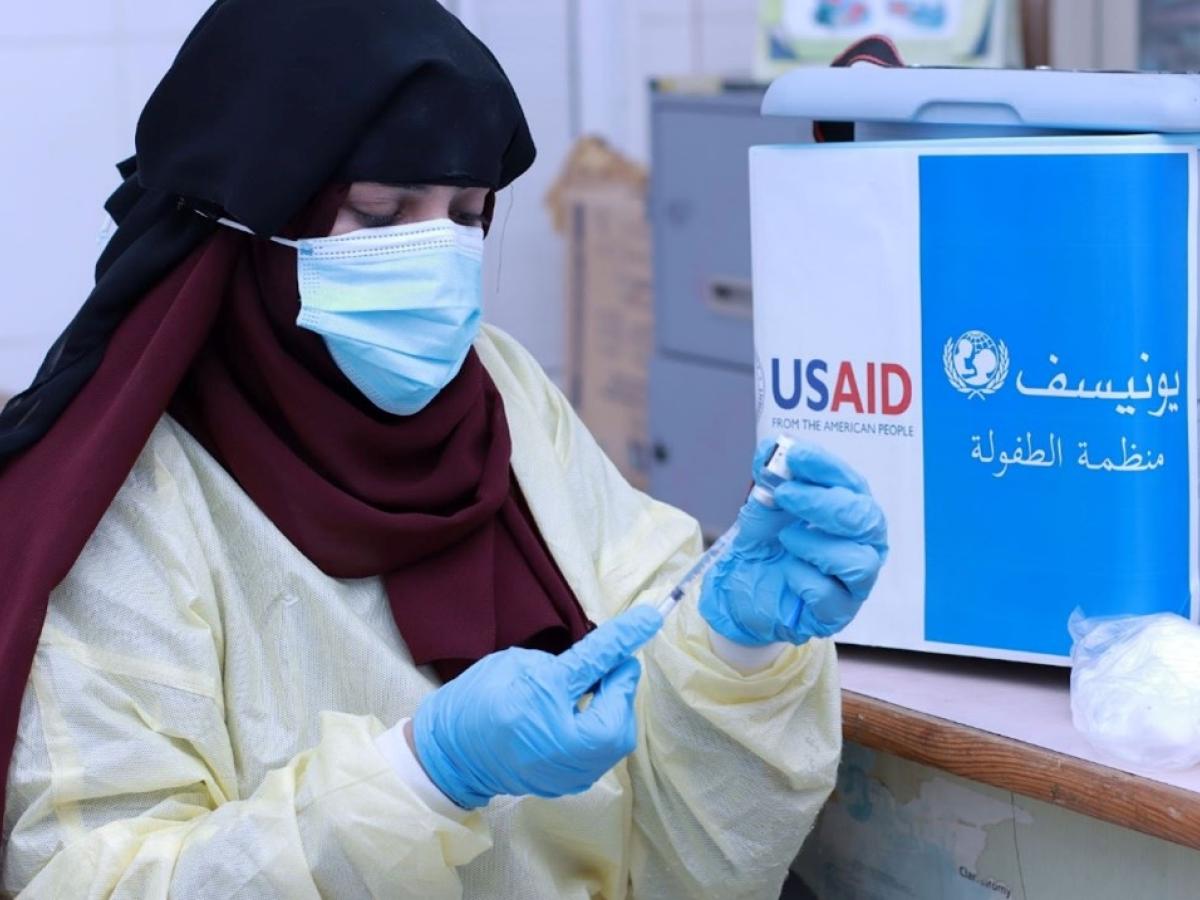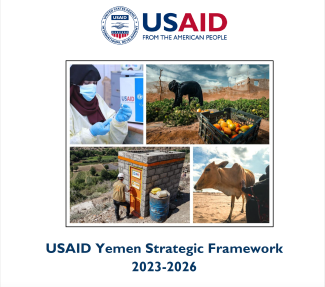Overview
USAID’s development assistance to Yemen helps end the need for emergency assistance, putting the country on a path to recovery, and creating a stronger foundation for durable peace.
USAID is supporting Yemen’s recovery and creating a stronger foundation for lasting peace.Yemen is suffering the largest humanitarian crisis in the world, exacerbated by eight years of civil war. The protracted conflict has resulted in the destruction of infrastructure, livelihoods, and social services, and weakened the resilience of communities and governance systems. USAID programs stabilize the economy, rebuild basic education and health systems, promote inclusion and reduce conflict, improve access to safe drinking water, and address new challenges such as the COVID-19 pandemic.
Our Work
ECONOMIC GROWTH
USAID supports economic institutions to prevent further economic deterioration and encourages the private sector to plan for and play a positive and inclusive role in the country’s return to stability. USAID partners with the Central Bank of Yemen to institute macroeconomic reforms to stabilize Yemen’s fragile economy and function as an independent institution to manage its money supply and foreign exchange reserves and regulate private banks. Support to the Ministry of Finance improves budget planning and execution processes and revenue generation while assistance to Yemen’s port authorities helps enhance the flow of goods within, into, and out of Yemen. USAID helps Yemenis improve their lives by promoting growth of the fisheries sector, increasing farm productivity, establishing market links, and helping small- and medium-sized enterprises increase employment and business income.
EDUCATION
USAID works to meet Yemeni children’s immediate educational needs while supporting long-term efforts to rebuild the education system that has been decimated from years of conflict. In partnership with development partners and the Yemeni Ministry of Education, USAID increases access to quality education services for vulnerable and conflict-affected children, including girls and children with disabilities. USAID trains teachers, provides schools with educational equipment and teaching and learning materials, and supports classroom-based learning for out-of-school children, particularly girls and children in internally displaced people camps. To prevent school dropouts, USAID has developed remedial and accelerated, non-formal education classes, and distance and home learning programs to support students whose schools closed due to insecurity, disease outbreaks, and climate shocks.
GOVERNANCE, PEACE, AND STABILITY
USAID promotes community cohesion and reconciliation, strengthens inclusion, and supports local governance. At the district and community levels, USAID brings together local government authorities and community members to find solutions to sources of conflict; strengthen institutions, organizations, and actors to meet citizens’ needs; serve as neutral arbitrators and peace-builders; foster social cohesion; and reignite pride in commonalities. Activities are inclusive, integrating women, youth, and other marginalized groups, including through small grants to advance peace, women’s empowerment, and community services.
HEALTH
USAID partners with the ROYG and other local partners to improve reproductive health, maternal, newborn, and child health, and nutrition services; promote healthy behaviors; and strengthen the health sector, particularly community and primary healthcare services. To bolster Yemen’s resilience to COVID-19, USAID coordinated a U.S. government donation of more than 300,000 COVID-19 vaccines and supported the donation with training health care workers, transport of vaccines to health facilities, cold storage capabilities to preserve vaccine effectiveness, oxygen to COVID-19 isolation units, and efforts to encourage communities to increase vaccination rates, as well as sharing awareness and prevention messages to help curb the spread of the virus.
WATER, SANITATION, AND HYGIENE (WASH)
USAID improves access to safe and sustainable water and sanitation for vulnerable Yemenis and increases their knowledge of good hygiene. Through training, USAID helps water and sanitation providers deliver services. More than 15 million people in Yemen do not have access to basic water and sanitation. USAID helps rehabilitate water systems including solarization, repair sewage network pipelines, builds household latrines, and rehabilitates WASH facilities in schools. USAID also provides hygiene awareness training sessions to prevent the spread of communicable diseases such as cholera and COVID-19.
HUMANITARIAN ASSISTANCE
As the largest humanitarian assistance donor to Yemen, USAID works to reduce the risk of famine and severe malnutrition, communicable disease outbreaks, and reduce life-threatening effects of Yemen’s conflict and economic crises. USAID’s health, WASH, nutrition, and food security programs work to prevent famine and severe malnutrition in areas most at risk of famine. With more than 17 million people facing dire food insecurity, USAID provides food assistance, largely through Title II funding. USAID prioritizes communities in emergency and catastrophic levels of food insecurity. USAID also advocates to protect civilians and civilian infrastructure, commercial imports, and humanitarian access to vulnerable communities in Yemen.


